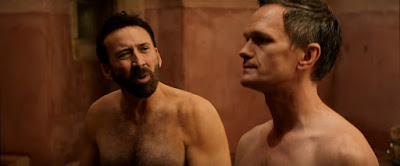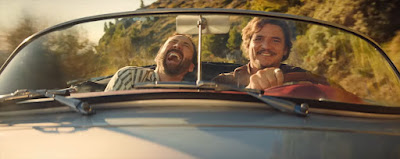or
Putting the "Meh" Back in "Meta"
I like "meta" in movies, when the Hollywood fantasy machine suddenly turns transparent, and something walks into frame that reminds you that "it's just a movie." The painted back-drop rolls out of frame to show the less-than-inspiring back-lot and makes the point that everything is calculated to make you believe in the situation portrayed and not that everything is "designed" to reinforce the falsehood. "Pay no attention to the man behind the curtain" shouts Oz. Or the gaffer. Or the boom-operator. Or the perpetual green-screen. We want you to see what we want you to see.
As Johnny Carson once joked "I can't believe 'Survivor' because I know that just off-camera there's a camera-grip eating a cruller."
But, it's a nice little joke to sometimes see the cruller. To see reality sneak in and wink. Like all the celebrity cameos in The Player. Like Julia Roberts (playing Tess Ocean in Oceans Twelve) trying to pretend to be movie-star Julia Roberts to pull off a scam (until Bruce Willis shows up and wonders why she can't remember their kids' play-dates).* Or when John Malkovich plays himself—or an actor named John Malkovich—in Being John Malkovich. Or, as in another Charlie Kaufman-penned screenplay, Adaptation., which is about the struggles of a screenplay-writer trying to write an "unfilmable" movie. Which starred Nicolas Cage.
Tom Gormicon's film The Unbearable Weight of Massive Talent is one shallow dive into the madness of the "meta"-verse while being a love-letter to the star appeal of Nicolas Cage, its star. The film is plastered and puttied with references and clips of past Cage films and roles as it builds up the character of Nick Cage—not Nicolas, notice—an actor of many iconic roles, beloved by a fan-base, but struggling with finding parts to pay off his massive debts, stemming from a recent (fictional, mind you) divorce.**
The problem is that "Nick"—fictional Nick—is an actor of intense sensibilities who has a tendency to go "all in" in his roles and that can be discouraging to directors who are looking for stable and not mercurial. Nick is a star ("of course, I don't have to do a 'read'") but hovering below the A-list ("Of COURSE, I'll do a 'read'!"), who has had a good run but now is in the doldrums of his career, discouraged by all the film-makers wanting "to go another direction." For a self-involved narcissist like Nick, this is a situation he cannot process and he endlessly obsesses over the unfathomable consideration that he might not be in demand. In another Cage-career reference, he debates with an Adaption.-like twin of his former self, Nicky (Nicolas Kim Coppola, Cage's birth name), who has all the insufferable grand-standing of...young Nicolas Cage. Nicky wants Nick to remember that he's not an actor, he's a *STAR* and the id/ego clashes between the two are the best parts of the movie (and though my view of the film is marginal, kudo's to real-life actor Nicolas Cage for being so brutally satiric in doing a brilliant imitation of himself!)
With a sizable hotel bill mounting up and no prospects, he decides to take an offer from his agent, Richard Fink (Neil Patrick Harris) to appear at a millionaire's birthday party for a sizable fee, despite his artistic ambivalence to the idea ("I'm not a trained seal!"). The millionaire is Javi Gutierrez (Pedro Pascal, at his puppy-dog best), who has made his fortune in olive oil (sounds familiar...), but under surveillance by the CIA in the form of agents Tiffany Haddish and Ike Barinholtz who suspect Javi of being a drug kingpin and the mastermind behind the kidnapping of a local politician's daughter.Javi is, in fact, a massive fan of Cage's—maybe more so than Cage, himself) and, after some initial truculence on the actor's part, they bond over movies ("Paddington 2—it made me want to be a better man"), their mutual love for Nick Cage, and the possibility to collaborate on a screenplay. But, soon, Nick is in conflict as he's approached by the CIA agents to help their kidnapping investigation by being their inside man at Javi's compound, a task that he's thoroughly incapable of handling. No amount of "nouveau shamanic" acting can prepare him for "spy-craft, subterfuge, what-have-you."
The first blush of the movie and its premise is enjoyable, sometimes even brave, but pretty soon the movie is too meta for it's own good—especially when it starts to follow the two main characters' screenplay breakdown of "character driven opening—typical Hollywood blockbuster—we need to clear our heads and work on the third act." Boy-Howdy! That third act consists of a deliberately (but not amusingly) clumsy action chase that culminates in Cage suddenly proving competent—at gun-point—even while suffering from a vicious knife wound in his leg. What starts out as a mildly interesting little satire of narcissism and fan adulation finally succumbs to a by-the-numbers plot that would only energize a rom-com...or the vehicle for a flavor of the month comedic actor graduating from television.
Oh, the potential was there. And every once in a while there's a glimmer that either the writers or the director were waking up to the idea that this could lead up to something interesting...but the movie finally succumbs to formula and wasted potential, like an actor "settling" for a project, finally showing that it doesn't even have the courage to have anything less than an "everybody's happy" ending. Paddington 2 took more chances. You think massive talent has unbearable weight, consider that there's no heavier burden than a great potential.
One has to review the movie that's there, though, not its possibilities or its potential, so leave any worthless suggestions in the "might've been" section of the blog (there isn't one). But, one story intrigues me—that Nicolas Cage (the real one) liked the script but kept turning it down, and once he agreed, really wanted to play the "Javi" part.
* On television, two of the best "meta" shows were "It's Gary Shandling Show" where Gary Shandling played himself in a sit-com or the blisteringly satirical high-wire act of "The Colbert Report" where Stephen Colbert played a windy blow-hard news reporter named Stephen Colbert.
** Cage in real life is in his fifth marriage. The ex-wife he's talking about in the movie is a fictional make-up artist he met while making Captain Corelli's Madolin, which is a real movie Cage made in 2001. Yeah, I know, it's confusing, but just keep in mind that the real-life Nicolas Cage is playing a fictional actor named Nick Cage, who looks, sounds and acts like Nicolas Cage and starred in all of Nicolas Cage's films. Got it?









No comments:
Post a Comment